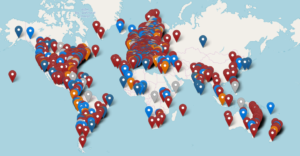“Humanity is only beginning to awaken to the true magnitude of the crisis on hand….In all realms, from money to ecological healing to politics to technology to medicine, we need solutions that exceed the present bounds of the possible. Fortunately, as the old world falls apart, our knowledge of what is possible expands, and with it expands our courage and our willingness to act. The present convergence of crises- in money, energy, health, water, soil, climate, politics, the environment and more- is a birth crisis, expelling us from the old world into the new. “
(Eisenstein, Charles: Sacred Economics, Evolver Editions, 2011, Intro. xx)
This April newsletter includes information about:
- Daylesford/Macedon Ranges Open Studios
- School Strike for Climate and National Day of Action- May 3rd
- Bob Brown Stop Adani convoy
- Mt Alexander Eco-Housing events and information
- Hepburn Shire’s Zero-net emissions community transition plan
- An Easter health check of key biodiversity areas
- Biodiversity and Re-vegetation talk- Trentham
- New Economy Network Journal– first edition
- Ramp up Resilience – Thoughtful programs about climate- Bendigo
- Ecological Economics Conference- call for papers and abstracts
- Plastic-bag-free campaign– Castlemaine
- Nature-inspired art workshop- Blampied
- Al Gore’s Climate Reality Training
- Sustainable housing education day- Castlemaine
- Energy efficiency short course- Castlemaine
- Citizen Science– Dead Tree Detectives
- Water Storages update
- Food for Thought– The terror of climate change transforming young people’s identity; and The future is Rural report
Daylesford/Macedon Ranges Open Studios

A diverse range of local artists and mediums including ceramics, drawing , mixed media, painting, photography, printmaking, sculpting, textiles and wearable art.
For more information on the program of artists and their studios: https://dmropenstudios.com.au/
School Strike for Climate- National Day of Action- May 3
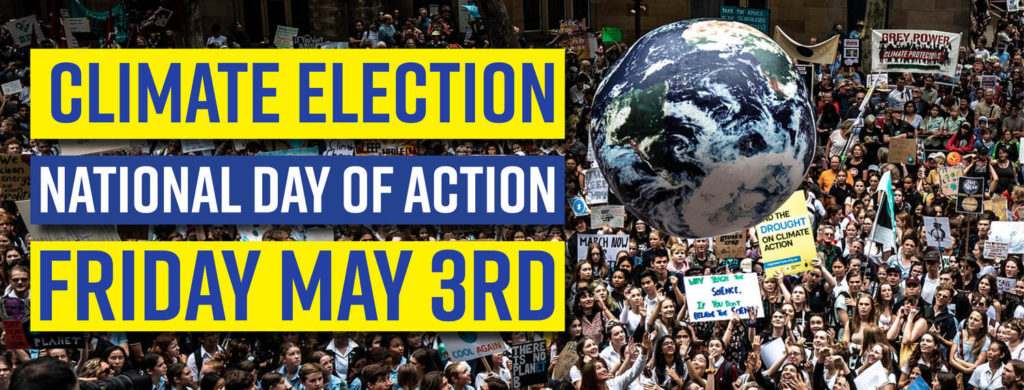
Castlemaine turned out in force on March 15th, along with students, their families and supporters from numerous other towns across central Victoria, for the student strike for climate. In fact Vline put on 4 extra buses to transport strikers and supporters from Castlemaine to Melbourne. Two young people from Castlemaine addressed the crowd from the steps of parliament in Melbourne, before the crowd walked several city blocks, carrying hand-made banners with simple and powerful messages. With more than 150,000 people striking across more than 60 locations in Australia, and more than 1.6 million people across more than 125 countries around the globe, this powerful and urgent movement, led by young people, continues to gather momentum.
The student strikers are making three demands: Stop the Adani coal mine; no new coal or gas; and 100% renewable energy by 2030.
The next strike, along with a national day of action, is planned for Friday May 3rd.
For more information: https://www.schoolstrike4climate.com/

Check out Localising Leanganook’s website- food for thought tab- (https://leanganook.org/food-for-thought/)to hear young student striker Harriet speaking at our community conversation in February. Also hear Elizabeth Boulton’s presentation, alongside the student strikers, focusing on a Hyper-response to the hyper-threat of climate & environmental change.
Bob Brown Stop ADANI Convoy
Adani announced in November last year that they are proceeding with their mine. 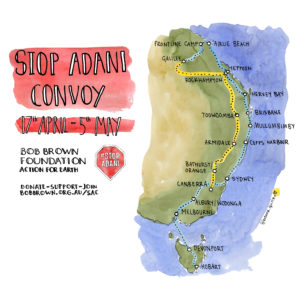
However, the company has no private sector funding, has not satisfied the legal requirements of its application, and still has a case against it in the High Court, taken by the traditional owners of the Galilee Basin, the Wangan and Jingalou People.
In spite of all this and in the hope that the mine will NOT proceed, the Stop Adani Convoy will leave Hobart on 17th April and arrive in Airlie Beach near Bowen in Nth Queensland, 8 days later on 25th April, before heading south again on 29th. The final stop for the convoy is Canberra on Sunday 5th May, where, hopefully, there will be a huge rally outside Parliament Building.
If you want to go and need a ride, please contact Trevor Scott (trevorscott3@gmail.com) or visit https://www.facebook.com/stopadani/. People joining the convoy will need to look after their own meals and accommodation along the way.
You can join the convoy at any point along the way, but obviously the sooner the better. You can do 5 Kms or 5,000 Kms. It doesn’t matter if you join for a short time and then leave – all support is gratefully accepted.
Mt Alexander Eco-Housing Group
Two upcoming events:
What: Maldon Tiny House Pre-Fabs Tour
When: 2pm Saturday 27th April
Where: 40 Templeton Street, Maldon
What: Psychological Safety: Resolving Conflicts in Living Communities
When:7pm— 8.30pm Friday 3 May
Where: Trades Hall 127 Mostyn St. Castlemaine (with toilet access)
Many people fear problems with conflict and communication in shared housing and living. This session by locals Samantha Wittenberg and Andrew Cowell will focus on such issues in constructive ways: A chance to experience how you can express your truth, be heard and listen in a way that leads to a deeper connection and understanding of your self and other. This is an opportunity to see how communication tools can benefit you in very practical ways, as someone who is considering living in community.
Samantha and Andrew have a passion for supporting individuals, couples and groups to enjoy a more life-enriching way of communicating and connecting. They will share ways of understanding without needing to label, judge or evaluate and offer a language and techniques based on the principles of nonviolent communication.
Other news:
At the March meeting David Rigby explained how he had established an affordable and sustainable house for sharing with another person to allow for both privacy and some shared living. He talked about design, building and gardening challenges, personal negotiations and his experiences.
Discussions are underway for the Eco Housing group to become a working group of Mount Alexander Sustainability Group (MASG).
WinC — Older Women in Cohousing, Inc., are planning to develop a co-housing project in Daylesford. They have a Facebook page- https://www.facebook.com/wincohousing/ .Women’s Property Initiatives is supporting this development: http://wpi.org.au/
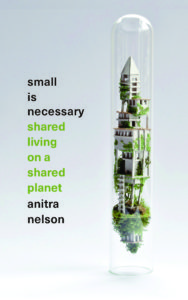
To keep informed: anitra.nelson@rmit.edu.au
Hepburn Zero Net Emissions- Community Transition Plan

This 10 year masterplan for Hepburn Shire is a road map to reach 100% renewable energy supply, zero-net energy and zero-net emissions by 2029. The report includes findings on emissions by sector, by source and also by Hepburn shire wards. Initiatives include community engagement, home energy efficiency audits, resident ride-share, climate smart farms, reducing waste to landfill, sustainable building codes and much more.
For more information: www.z-net.org.au/hepburn
An Easter health check of Key Biodiversity Areas
What: Preparatory workshop, organised by Connecting Country
Where: Newstead Community Centre
When: Friday 12 April 2019: 9.00 to 11.30 am
Bookings: Please click here
BirdLife is looking for local people to complete a 2019 Easter health check for each KBA. To assist, Connecting Country is running a workshop on Friday 12 April 2019 in Newstead. We’ve invited Greg Turner from BirdLife Victoria to take us through the process for our part of the Bendigo Box Ironbark area. Geoff Nevill from the Muckleford Forest Friends Group will also talk about his group’s work in the region.
BirdLife International has identified areas of conservation importance around the world as Key Biodiversity Areas (KBAs). This includes KBAs here in our region – the Bendigo Box Ironbark area. Our KBAs were designated especially for their importance for two special birds, Diamond Firetail and Swift Parrot, and cover both public and private land.
Three KBAs in the Mount Alexander Shire are Clydesdale-Strangways; Sandon-Strathlea; and Muckleford-Newstead.
Birdlife’s Easter health check takes an annual snapshot of the threat and conservation actions of the areas that matter most to birds. BirdLife compares results between KBAs across Australia and around the globe. The results are extremely valuable, especially for identifying species decline and targeting conservation work. For more information on the KBA and the Easter health check process click here.
This annual check is all about assessing habitat and its threats. Anyone with an interest in landscape restoration is most welcome to come along and get involved, whether you’re a beginner or an experienced birdwatcher.
This is a free event, with morning tea and refreshments provided. Any questions, contact Ivan Carter at Connecting Country on (03) 5472 1594 or ivan@connectingcountry.org.au.
Biodiversity and Re-vegetation talk- Trentham
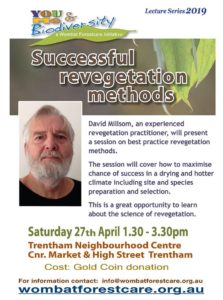
When: Saturday 27 April 2019 from 1.30 to 3.00 pm
Where: Trentham Neighbourhood Centre,
Cost: Gold coin donation
Wombat Forestcare is hosting an opportunity to learn about maximising revegetation success with David Millsom , an experienced revegetation practitioner.
Contact info@wombatforestcare.org.au or see www.wombatforestcare.org.au
The talk will cover:
- Drivers for and development of large scale revegetation techniques.
- Site preparation for tubestock and direct seeding.
- Site selection.
- Species selection – what to plant and why.
- Provenance, origin of the term and what genetics are telling us.
- Seed treatments – overview of how to maximise germination, use of smoke, heat, cold and other methods.
- Research, development and application of live bacteria innoculant for native legumes.
- How to maximise chance of success in a drying and hotter climate.
New Economy Network Journal – First edition
Learn from others about how we can build a new, just and sustainable economy via personal stories about leaving the rat race, interviews with federal politicians, critiques of government policy, comparisons of sex with farming, profiles of social enterprises, calls for nuanced discourse on population, poetry, the Uluru Statement from the Heart, analysis of the state of ecological economics, and more. Free online HERE
The NENA Journal is a place for contribution and conversation for those interested and involved in the New Economy movement. NENA Journal is an open platform and encourages unsolicited submissions. If you’d like to submit a piece for publication, email journal@neweconomy.org.au
Ramp up Resilience- thoughtful programs about climate
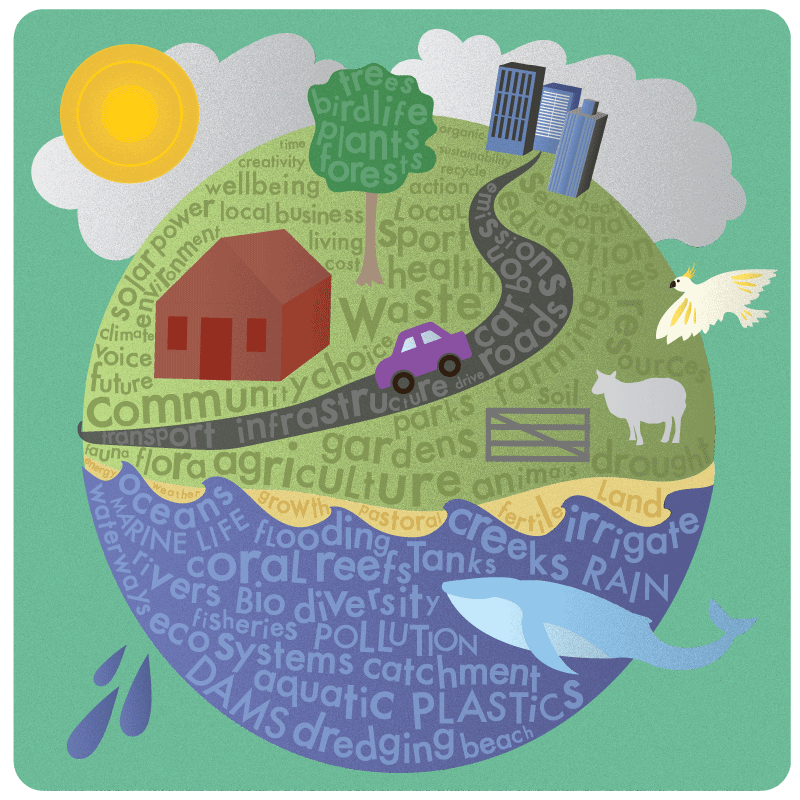
From April to October 2019, Make a Change Bendigo are running a community initiative to encourage people to think and talk about the weather and climate, how it impacts us and what we can do about it.
Everyone is invited to participate in any way that suits:
Tell us what you reckon – complete a questionnaire here
See what locals are saying – learn more here
Attend events in Rochester, Inglewood and Raywood – register here
Become a local partner or ambassador – ask us how here
Get in touch directly – contact us here
Sign up to our e-news to stay in the loop, receive updates and direct event invitations!
For more information: https://www.makeachange.org.au/
Ecological Economics: Solutions Now and In the Future — Call for paper abstracts and registrations
The ANZSEE 2019 conference will explore appropriate approaches and techniques for re-balancing the human–nature interactions that are central to the study and practice of ecological economics — solutions now and in the future.
We are calling for abstracts for papers and four-paper panel sessions on the following indicative topics:
- Ecological economics
Defining, framing and understanding ecological economics for current ecological and economic challenges — where to now?
- Sustainable urban, rural and regional futures
Ecologically economic cities; vital rural and regional areas; post-anthropogenic cities; integrating urban and rural economic and ecological rifts; innovative governance in sustainable urban, rural and regional futures.
- Ecological limits and planetary boundaries
Population limits; planetary limits; economics and planetary limits; the I=PAT formula today; immigration policies, refugees and migration; the problem of denial of limits.
- Ecological ethics and worldviews: Intrinsic value/s of nature
Eco-centrism; eco-democracy; ecological justice.
- First Nations and Indigenous economies
First Nations economics; decolonising ecological economies; innovative case studies from Indigenous communities.
- Transformative technologies in a bounded world
Appropriate technologies for, and threats to, ecologically balanced human societies.
- Embedding ecological economics into education systems
Key ecological economics concepts and approaches; case studies, proposals and existing practices.
- Communicating ecological economics; influencing decision makers
Defining and framing ecological economics; grassroots movements and ecological economics; effective communication models and processes; ecological economics informing economic transformation.
Please send abstracts (250-word limit) and bios (150-word limit) to conference coordinator Anitra Nelson — anitra.nelson@rmit.edu.au by 11.59pm Monday 29 April 2019. Include a short title and up to four keywords for your contribution. We expect the selection process to be finalised mid-May 2019.
Note that inexpensive conference registrations are now open: $200/$100 for two full days (25–26 November) plus $45 (dinner, 24 November) We have a limited number of places so we urge you to register early. Explore options and book here now.
Email Anitra Nelson (anitra.nelson@rmit.edu.au) with any queries and for more details.
Plastic Bag free campaign event
Castlemaine celebrated the transition from plastic to canvas bags at last month’s fringe festival. Watch this youtube clip:
Nature inspired art workshop- Blampied

No experience is necessary. Nicola will provide some of her own designs to use or manipulate and if you’re feeling confident you can push the boundaries and create your own imagery and compositions using textures and patterns provided. Suitable for age 14 and over.
Cost: $95 including afternoon tea.
http://www.nicolacerini.com.au/product-category/workshops/
This workshop will be held at the beautiful straw eco farmstay ‘Orto’ in Blampied, between Daylesford and Creswick. The farm has limited accommodation for up to two couples.
For more information: https://villagedreaming.com.au/
Al Gore’s Climate Reality Training
Applications for Al Gore’s Climate Reality Training need to be in by April 18th. The training is in Brisbane June 5-7. https://www.climaterealityproject.org/training.
There is no charge for this training but you do have to apply and make your own way there. Daylesford/Newstead resident Laurel Freeland, who attended the training a few years back, is happy to field any questions for those who might be interested: laurelfreeland@bigpond.com. It is now time to ramp up the action on climate emergency and the training includes masses of up to date resources and networks.
Sustainable Housing Education Day
When:Sunday 19th May
Bookings: Available in April
For more information: http://masg.org.au
Don’t forget to save the date for SHED (Sustainable Housing Education Day) It has been two years since our last one, and we have four more beautiful, sustainable houses for you to look at and get inspiration from. We will showcase some of the most sustainable building techniques and materials with the added benefit of having the owners and builders there to talk to us about their experiences, talk you through the decisions they had to make and the pros and cons of each part of the build. At the end of the day there will be an informative panel discussion as well.
Energy Efficiency Short Course
When: 1-3pm Saturday May 4th, 11th, 18th 25th, June 1st, 15th and 22nd
Where:Ray Bradfield rooms, next to Victory Park and Maxi IGA carpark
Cost:$70 full / $40 concession
Hans van Gemert is running a short (seven weeks) course through the U3A in Castlemaine in May/June. As not everyone can be a U3A member you can also do the course through us! We will run the 7 week course, starting 4th of May at the Ray Bradfield rooms. Hans offers a comprehensive and detailed series on topics ranging from the principles of heat flow to gap sealing and double glazing. Contact Mt Alexander Sustainability Group (MASG) office to book in or for more details.
The Dead Tree Detective- Scientists need help spotting dead trees
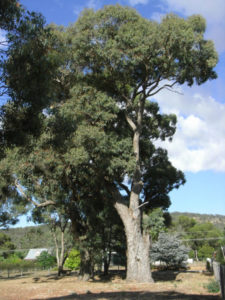
Have you seen dead or dying trees in your area? No doubt with the current hot and dry conditions, many of us have seen trees under severe moisture and heat stress.
A collective of concerned scientists have launched a new citizen science project, The Dead Tree Detective, which aims to record where and when trees have died in Australia. Unfortunately, the current drought across many regions of Australia has been so severe that some native trees have died or are under severe stress. It is important to document these occurrences, which will assist scientists in understanding and predicting how native forests and woodlands are vulnerable to climate extremes.
This project will allow people Australia-wide to report observations of tree death. In the past, there have been many occurrences of large-scale tree death that were initially identified by concerned members of the public such as farmers, bushwalkers, bird watchers or landholders. Collecting these observations is an important way to monitor the health of trees and ecosystems.
Climate extremes have pushed some of our local iconic native trees to their limits of survival, so it is essential to document which species are surviving better than others under these conditions. This project allows you to upload photos of your trees and answer a few questions to help identify the possible causes. You will find some information about each of these causes in the ‘Resources’ section. You can even revisit the locations in following months to document whether trees recover or not. To see what other records there are in your area, go to the ‘Data’ section. See the ‘Blog’ for details of any new major tree death events that we have become aware of.
Please click here to upload photos regarding this project and to read the full project description, which is hosted on the Atlas of Living Australia.
For further information: Connecting Country- https://connectingcountry.org.au/the-dead-tree-detective-scientists-need-your-help-spotting-dead-trees
Water Storages Update
The North Central Catchment Management Authority is monitoring water levels across our region drawing on data available through Coliban and Goulburn Murray Waters’ websites.
With continued limited inflows, most storage levels continue to decrease. Storage levels for March 2019 are:
Lake Eppalock – 40 %
Cairn Curran Reservoir- 34%
Tullaroop Reservoir – 40%
Laarnecoorie Reservoir – 37%
Newlyn Reservoir – 37%
Hepburns Lagoon – 28%
For more information and detailed graphs:
https://www.coliban.com.au/site/root/water_security/reservoirs.html
https://www.g-mwater.com.au/water-resources/catchments/storage-levels
Food for Thought
The Terror of Climate Change is transforming young peoples identity
Read this thoughtful article on the student strike for climate written by a young person:
The Future is Rural report, (https://www.postcarbon.org/publications/the-future-is-rural/) published by the Post Carbon Institute, challenges conventional wisdom about the future of food in our modern, globalized world. It is a much-needed reality check that explains why certain trends we take for granted–like the decline of rural areas and the dependence of farming and the food system on fossil fuels–are historical anomalies that will reverse over the coming decades. Renewable sources of energy must replace fossil fuels, but they will not power economies at the same scale as today. Priorities will profoundly shift, and food will become a central concern. Lessons learned from resilience science and alternatives to industrial agriculture provide a foundation for people to transition to more rural and locally focused lives.

![[ Random Image ]](https://leanganook.org/images/image_14.jpeg)
